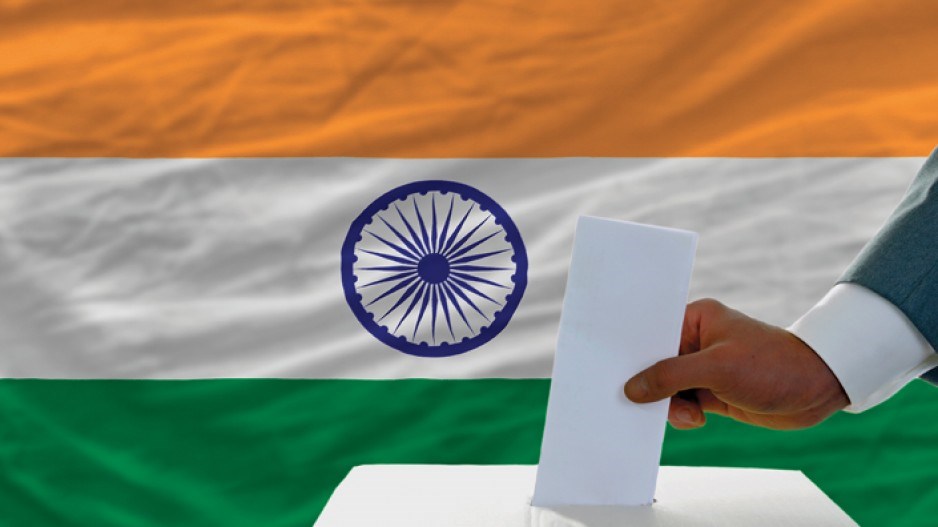The Indian general election, the world’s largest single exercise in democracy, is under way, and when the results are announced on May 16 it is likely to produce an avowedly business-friendly government led by the controversial head of the Bharatiya Janata Party (BJP), Narendra Modi.
Modi has bounded onto India’s national stage after serving as the chief minister (premier) of Gujarat state since 2001 and overseeing economic development averaging 10.08% per year, well above the national average of 8.28%.
There is, however, widespread skepticism in commercial and economic circles that Modi can easily transfer his open-market and deregulation policies from Gujarat to the national stage.
Polls show that more than half of India’s 814 million registered voters favour Modi becoming prime minister. But it is unlikely, in India’s complex electoral climate of regionally based parties fighting for a share of the 543 seats in parliament, that his Hindu nationalist BJP can win an outright majority.
Modi will have to compromise with regional and other special interests in order to construct a governing coalition. Economic and commercial policies are therefore likely to look more like a continuation of those of the current Congress Party government led by Prime Minister and former finance minister Manmohan Singh, than the radical departure Modi and many of his supporters would like to pursue.
Modi will try to re-energize the programs of privatization and deregulation that were sidelined after being put forward by Singh as finance minister in the 1990s.
A Modi government will also try to build on tentative steps taken by the current government to privatize elements of India’s massive railway network, the country’s key transportation infrastructure.
He will probably try to use public-private partnerships (PPPs) to develop high-speed rail links on important routes such as Chennai-Bangalore, Delhi-Chandigarh and Ahmedabad-Mumbai.
The PPP approach will probably also be used to try to extend the privatization of airport services and infrastructure.
India’s major airports in Delhi, Bangalore and Mumbai have already been privatized, and Modi is expected to try to expand this approach to other cities.
It is expected a Modi government will continue to promote the development of national manufacturing investment zones and industrial corridors.
He has also talked about building “smart cities,” already incorporated in plans for the Mumbai-Delhi industrial corridor.
This envisages cities with integrated manufacturing and service sectors, extensive fibre-optic networks and high-tech transportation systems.
However, for smart cities to function effectively, Modi will have to put more investment into social infrastructure, especially education, than he has in Gujarat, where literacy and higher education rates lag well behind the national average.
Modi has said he wants to simplify India’s dauntingly complex tax system.
He has spoken in favour of a national general goods and services tax (GST) to replace a host of sales taxes imposed by individual states.
This will require some philosophical contortions.
As chief minister of Gujarat, Modi has argued against a GST administered by the central government, and as prime minister he is likely to face the same opposition from state governments that he himself has mounted.
Modi has gained a well-founded reputation for probity and hard work.
But controversy surrounds the intensity of his Hindu nationalism and the still-unanswered questions about his role in the 2004 riots in Gujarat in which nearly 800 Muslims and over 250 Hindus were killed.
The prospect that Modi will become India’s next prime minister has, however, drawn a curtain over questions about his human-rights record. In recent weeks, U.S. and European Union officials have swallowed their doubts and sought to develop convivial and functional relationships with him. •
Jonathan Manthorpe ([email protected]) has been an international affairs columnist for nearly 40 years.
Great expectations for Indonesian presidential hopeful Joko Widodo
Such is the popularity and inspiring image of Joko “Jokowi” Widodo, the governor of the Indonesian capital, Jakarta, that when it was announced on March 14 he will run for the presidency in July elections, the main stock index rose by more than 3%.
Even though the 52-year-old former furniture manufacturer has only meagre political experience, as a small-town mayor and governor of Jakarta since October 2012, his arrival on the national stage is being festooned with extraordinary expectations. He is seen as the man who can get the country functioning and who can root out the endemic corruption that has mired Indonesia since the advent of democracy 15 years ago.
Jokowi, as everyone calls him, has been anointed by former president Megawati Sukarnoputi as the candidate for her Indonesian Democratic Party of Struggle. The latest sampling of public opinion gives Jokowi 37.4% of popular support. His nearest rival is former army general Prabowo Subianto with 14.5%.
Aburizal Bakrie, one of Indonesia’s richest men and candidate for the country’s longtime natural party of power, Golkar, has only 9.9% support.
The overture to the July presidential race starts this week with legislative elections. To be eligible to field a candidate in July, a party or coalition must win 20% of the seats in parliament or 25% of the vote.
If the polls are right, Jokowi will have little trouble jumping that hurdle. However, public expectations of what Jokowi can achieve as president may be unrealistic. They are based on his 17 months as governor of Jakarta. In that time he has done a credible job and has started to fix some of the capital’s seemingly intractable problems, such as annual flooding, slum clearance, illegal vendors, civic officials who don’t bother turning up for work, and the 25-year delay of construction of a rail transit system.
After July, it seems, Indonesians are going to find out whether this is enough training to run a country of 15,000 islands, 250 ethnic groups and 250 million people.




